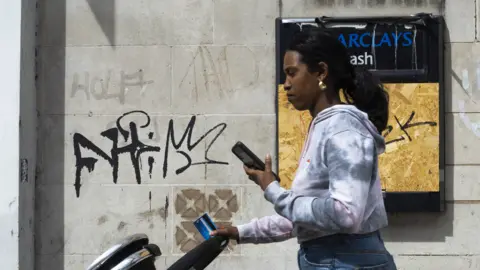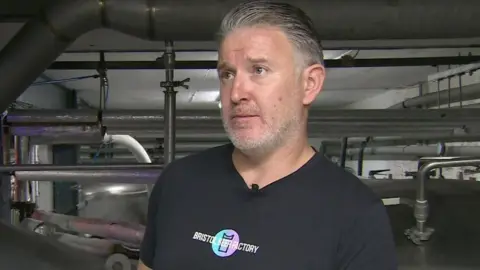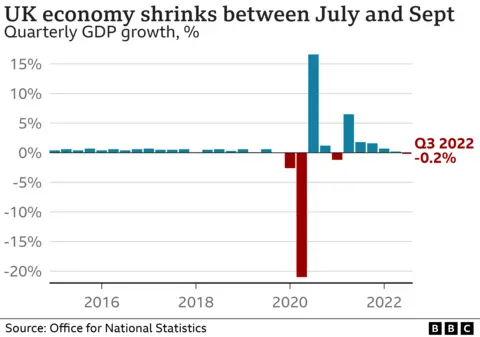Recession looms as UK economy starts to shrink
 Getty Images
Getty ImagesThe UK economy shrank between July and September as the country heads into what is expected to be the longest recession on record.
The economy contracted by 0.2% during the three months as soaring prices hit businesses and households.
A country is in recession when its economy shrinks for two three-month periods in a row. The UK is expected to be in one by the end of the year.
The Bank of England has forecast a "very challenging" two-year recession.
A recession has been widely expected in the UK due to the prices of goods such as food, fuel and energy soaring, which is down to several factors, including the war in Ukraine.
Higher prices for goods has led to many households facing hardship and cutting back on spending, which has started to drag on the economy.
When a country is in recession, it's a sign that its economy is doing badly.
During recessions, companies typically make less money and the number of people unemployed rises. Graduates and school leavers also find it harder to get their first job.
This means the government receives less money in tax to use on public services such as health and education.
The Bank of England expects the UK recession to be the longest since records began in the 1920s and said unemployment will almost double.
Chancellor Jeremy Hunt said he would try to make any recession "shallower and quicker" than predicted.
But he has warned of "eye-watering" decisions needed on public spending and taxation to "restore confidence and economic stability".
Mr Hunt said he was "under no illusion that there is a tough road ahead".
He is set to unveil his tax and spending plans next week in the Autumn Statement, which comes as households are being squeezed by the worst cost-of-living crisis since the 1950s.
'World Cup and Christmas key'

Sam Burrows, managing director of Bristol Beer Factory, told the BBC he has been weighing up how much of his soaring business costs can be passed on to customers in recent months.
"We can't price consumers out. We need people in pubs eating, drinking and enjoying the hospitality sector, so it's a balancing act for me," he said.
Mr Burrows said he wanted to invest and expand his business but was having to factor in the current economic climate.
However, he said the World Cup and Christmas were coming at the right time.
"A bit of national pride and some positive energy with a good performance in the World Cup, Christmas spending, it's all going to help hospitality," he added.
Countries all around the world are experiencing high price rises, but the UK economy is performing the worst compared to other major nations, and is smaller than it was before the Covid pandemic.
The Office for National Statistics (ONS), which published the economic growth figures, said UK business investment had dropped in the three months to September and also remained below its pre-pandemic levels.
The performance of the economy is measured by the value of all the goods and services produced by the UK. This number is known as the gross domestic product (GDP).
The fall in GDP in the three months to September was driven by a decline in manufacturing, which was seen "across most industries", the ONS said.
The ONS publishes its estimate of GDP and does sometimes revise it upwards or downwards. For example, it initially estimated that the economy shrank by 0.3% in August, but later revised that and said it shrank by 0.1%.

Darren Morgan, director of economic statistics at the ONS, said customer-facing industries also "fared badly", with shops hard hit as the squeeze on household budgets meant people were spending less.
According to Mr Morgan, the biggest concerns businesses said they were now facing were the rising price of raw materials and higher energy costs.
He said some firms had taken action to reduce costs by being "far more diligent", switching to more energy-efficient equipment, and changing supplier.
Mr Morgan said the additional bank holiday for Queen Elizabeth II's funeral played a part in the economy's poor performance in September as some businesses closed or had shorter opening times. The economy shrank by 0.6% alone in September.
Rachel Reeves, Labour's shadow chancellor, said the latest economic figures were "another page of failure in the Tories' record on growth".
"Britain's unique exposure to economic shocks has been down to a Conservative-led decade of weak growth, low productivity and underinvestment and widening inequality," she added.
Martin McTague, chairman of the Federation of Small Businesses, called the latest economic figures "dreadful news" for firms that were already under pressure.
"Lower levels of reserves and resources mean they are more vulnerable to downturns, and at a time when confidence is deteriorating in both consumers and businesses, the outlook for the UK economy is now very bleak indeed," he said.
